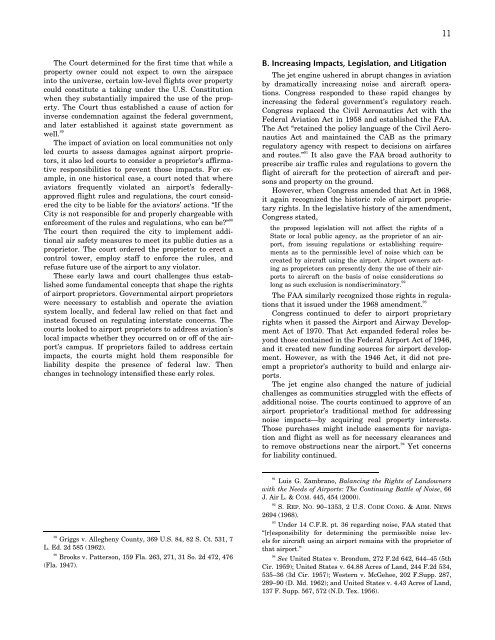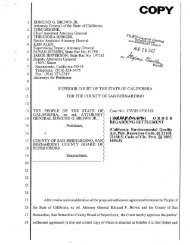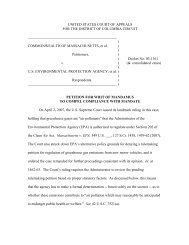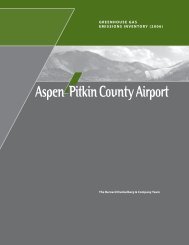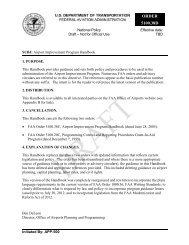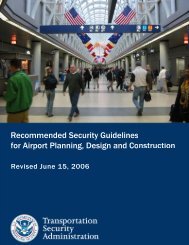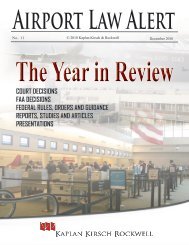ACRP Legal Research Digest 10
ACRP Legal Research Digest 10
ACRP Legal Research Digest 10
You also want an ePaper? Increase the reach of your titles
YUMPU automatically turns print PDFs into web optimized ePapers that Google loves.
11<br />
The Court determined for the first time that while a<br />
property owner could not expect to own the airspace<br />
into the universe, certain low-level flights over property<br />
could constitute a taking under the U.S. Constitution<br />
when they substantially impaired the use of the property.<br />
The Court thus established a cause of action for<br />
inverse condemnation against the federal government,<br />
and later established it against state government as<br />
well. 89<br />
The impact of aviation on local communities not only<br />
led courts to assess damages against airport proprietors,<br />
it also led courts to consider a proprietor’s affirmative<br />
responsibilities to prevent those impacts. For example,<br />
in one historical case, a court noted that where<br />
aviators frequently violated an airport’s federallyapproved<br />
flight rules and regulations, the court considered<br />
the city to be liable for the aviators’ actions. “If the<br />
City is not responsible for and properly chargeable with<br />
enforcement of the rules and regulations, who can be?” 90<br />
The court then required the city to implement additional<br />
air safety measures to meet its public duties as a<br />
proprietor. The court ordered the proprietor to erect a<br />
control tower, employ staff to enforce the rules, and<br />
refuse future use of the airport to any violator.<br />
These early laws and court challenges thus established<br />
some fundamental concepts that shape the rights<br />
of airport proprietors. Governmental airport proprietors<br />
were necessary to establish and operate the aviation<br />
system locally, and federal law relied on that fact and<br />
instead focused on regulating interstate concerns. The<br />
courts looked to airport proprietors to address aviation’s<br />
local impacts whether they occurred on or off of the airport’s<br />
campus. If proprietors failed to address certain<br />
impacts, the courts might hold them responsible for<br />
liability despite the presence of federal law. Then<br />
changes in technology intensified these early roles.<br />
B. Increasing Impacts, Legislation, and Litigation<br />
The jet engine ushered in abrupt changes in aviation<br />
by dramatically increasing noise and aircraft operations.<br />
Congress responded to these rapid changes by<br />
increasing the federal government’s regulatory reach.<br />
Congress replaced the Civil Aeronautics Act with the<br />
Federal Aviation Act in 1958 and established the FAA.<br />
The Act “retained the policy language of the Civil Aeronautics<br />
Act and maintained the CAB as the primary<br />
regulatory agency with respect to decisions on airfares<br />
and routes.” 91<br />
It also gave the FAA broad authority to<br />
prescribe air traffic rules and regulations to govern the<br />
flight of aircraft for the protection of aircraft and persons<br />
and property on the ground.<br />
However, when Congress amended that Act in 1968,<br />
it again recognized the historic role of airport proprietary<br />
rights. In the legislative history of the amendment,<br />
Congress stated,<br />
the proposed legislation will not affect the rights of a<br />
State or local public agency, as the proprietor of an airport,<br />
from issuing regulations or establishing requirements<br />
as to the permissible level of noise which can be<br />
created by aircraft using the airport. Airport owners acting<br />
as proprietors can presently deny the use of their airports<br />
to aircraft on the basis of noise considerations so<br />
long as such exclusion is nondiscriminatory. 92<br />
The FAA similarly recognized those rights in regulations<br />
that it issued under the 1968 amendment. 93<br />
Congress continued to defer to airport proprietary<br />
rights when it passed the Airport and Airway Development<br />
Act of 1970. That Act expanded federal roles beyond<br />
those contained in the Federal Airport Act of 1946,<br />
and it created new funding sources for airport development.<br />
However, as with the 1946 Act, it did not preempt<br />
a proprietor’s authority to build and enlarge airports.<br />
The jet engine also changed the nature of judicial<br />
challenges as communities struggled with the effects of<br />
additional noise. The courts continued to approve of an<br />
airport proprietor’s traditional method for addressing<br />
noise impacts—by acquiring real property interests.<br />
Those purchases might include easements for navigation<br />
and flight as well as for necessary clearances and<br />
to remove obstructions near the airport. 94<br />
Yet concerns<br />
for liability continued.<br />
89<br />
Griggs v. Allegheny County, 369 U.S. 84, 82 S. Ct. 531, 7<br />
L. Ed. 2d 585 (1962).<br />
90<br />
Brooks v. Patterson, 159 Fla. 263, 271, 31 So. 2d 472, 476<br />
(Fla. 1947).<br />
91<br />
Luis G. Zambrano, Balancing the Rights of Landowners<br />
with the Needs of Airports: The Continuing Battle of Noise, 66<br />
J. Air L. & COM. 445, 454 (2000).<br />
92<br />
S. REP. NO. 90–1353, 2 U.S. CODE CONG. & ADM. NEWS<br />
2694 (1968).<br />
93<br />
Under 14 C.F.R. pt. 36 regarding noise, FAA stated that<br />
“[r]esponsibility for determining the permissible noise levels<br />
for aircraft using an airport remains with the proprietor of<br />
that airport.”<br />
94<br />
See United States v. Brondum, 272 F.2d 642, 644–45 (5th<br />
Cir. 1959); United States v. 64.88 Acres of Land, 244 F.2d 534,<br />
535–36 (3d Cir. 1957); Western v. McGehee, 202 F.Supp. 287,<br />
289–90 (D. Md. 1962); and United States v. 4.43 Acres of Land,<br />
137 F. Supp. 567, 572 (N.D. Tex. 1956).


